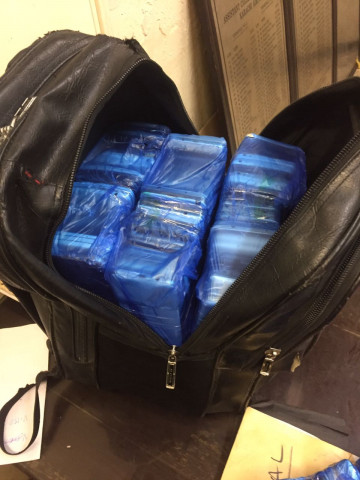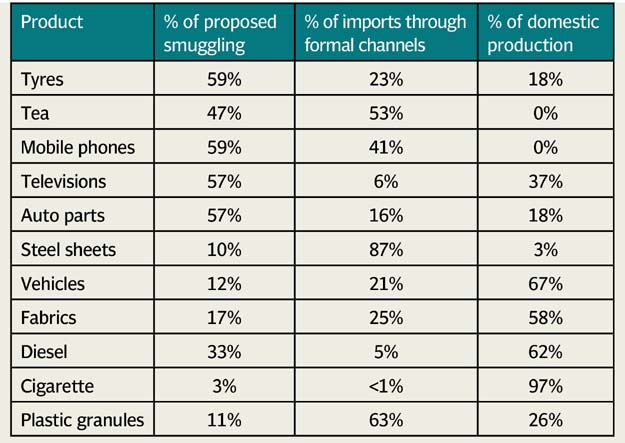Smuggled goods account for 59% demand across major sectors
Customs department report reveals alarming statistics for Pakistan

PHOTO: CUSTOMS
It estimated that 59% of the total demand for products of over half a dozen sectors of the formal economy, including petroleum, tea, mobile phones and auto parts industry, is met through illicit trade of smuggled goods. The development is in part an explanation as to why Pakistan continues to suffer from low tax revenue, a difficult growth path, and failure to attract investment across various formal sectors.
The Model Customs Collectorate (MCC) Preventive, Karachi investigated 13 commodities prone to smuggling in Pakistan, for fiscal year 2014 and came to the conclusion that 11 of them were severely impacted due to illegal trade.
The MCC Preventive, Karachi report, which was last updated in May 2015, stated, “Approximately 59% of the demand for tyres was satisfied through illegal channels and may have been met through smuggling.”
The customs official, who shared the confidential study with The Express Tribune, said this was the latest report on smuggling in Pakistan, as the concerned department updates the report once in two to three years.
“Around 47% of the demand for tea was satisfied through illegal channels,” it stated and added the share of smuggled mobile phones in the total demand stood at 59%, while the rest was met through formal imports, as the country does not domestically produce cellular phones.
The report stated, “The share of smuggled televisions stood at 57%, while the rest of the demand was met through domestic production (37%) and imports (6%).”

The share of smuggled auto parts in the total demand stood at 57%, while the rest of the demand was met through domestic production (18%), imports (16%) and counterfeit (9%). Around 10% demand for steel sheets is met through smuggling, 87% though formal imports, while rest is met through through domestic production.
Similarly, 12% demand for vehicles is met through smuggling, 67% through domestic production and remaining 21% through formal imports. The prevailing demand for fabrics was met through 17% smuggling, 58% domestic production and the rest 25% through imports, while the smuggling of diesel carries a share of 33%.
Cigarettes meet 3% demand and plastic granules meet 11% through smuggling, the report said.
Transit trade to the neighbouring landlocked state Afghanistan has played a key role in promoting illegal trade with Pakistan, it added.
Smuggling to GDP ratio
“Pakistan’s GDP is $232.3 billion (World Bank, 2014 report). The smuggling-to-GDP ratio for the 11 commodities investigated under the study accounts for 3.88% of the country’s total GDP and is 9.46% of the total tax collected by FBR.”
The smuggling-to-GDP ratio is not only significantly higher than the countries of the region, which operate more or less under the same dynamics, but is also higher when compared to countries having a similar GDP.
China gives fresh assurance on CPEC financing
For instance, India’s smuggling-to-GDP ratio (at least for goods, which have been studied) is only 0.43%, while Bangladesh’s is also only 0.04%. Not only this, countries with similar GDP, such as Greece and Ireland, have a ratio of only 0.78% and 0.47%, respectively.
Pakistan’s economy, which is worth over $313 billion now with GDP growth rate of 5.7% in FY18, is estimated to have developed an equivalent undocumented economy over the years. Smuggling has played a key role in fueling the informal economy and restricting growth.
The MCC Preventive Karachi suggested in the study to rationalise import tariffs, control smuggling through only one law enforcement agency, rather than many at present, renegotiate bilateral trade agreement to discourage smuggling and invite new investment and create job opportunities.
Published in The Express Tribune, July 26th, 2018.
Like Business on Facebook, follow @TribuneBiz on Twitter to stay informed and join in the conversation.



















COMMENTS
Comments are moderated and generally will be posted if they are on-topic and not abusive.
For more information, please see our Comments FAQ